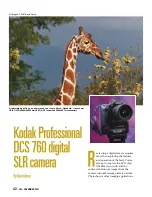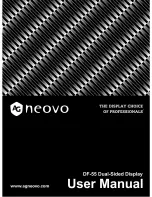
capture system. This can be
upgradeable with downloads from
Kodak’s website,
www.kodak.com
.
There are only three menus that
drive the DCS 760, making it quick
to learn and easy to use. There is
also an optional choice to display
an image on an NTSC or PAL
television monitor. The manual
supplied as a PDF file on a separate
CD-ROM deals more with the
operation of the Nikon F5 body in
all of its modes than it does with
the operation of the digital systems.
One of the best features of this
camera is in the image file itself.
None of the captured data is
permanently affected by any of the
menu choices. So, if a photographer
is shooting indoors with a tungsten
color temperature setting in the
white balance menu and then works
outside in daylight without changing
it, the setting can be reset in the
Photo Desk software at a later time
without altering any of the original
data. Kodak accomplishes this by
altering the header data in each file,
not the pixels. The only setting that
seems to alter the captured data is
the ISO (80-400), which is set on the
camera the same way it is in the
film version of the Nikon F5.
Software
The not-so-great news is that
Photo Desk, the software devel-
oped for working with the Kodak
Professional DCS 760 files, is not
designed for professional needs. It
has no documentation, save the
help file that’s accessed by clicking
the question mark icons on each
screen. Though it’s somewhat
intuitive, this and any professional
package needs some form of user
guide beyond the built-in help
menu for using it.
Photo Desk works on either the
Macintosh or Windows platform.
And for a first version effort, isn’t
PEI • NOVEMBER 2001 •
45
Maasai warriors from several manyattas gather on a plateau to dance the ipid, jumping
high to demonstrate their vigor. Young women watch to see which warrior jumps the
highest, signifying his strength and attractiveness. Handheld,
1
⁄
200
second at f/4, ISO 400
(Nikkor 80-200mm f/2.8 D AF-S lens).























